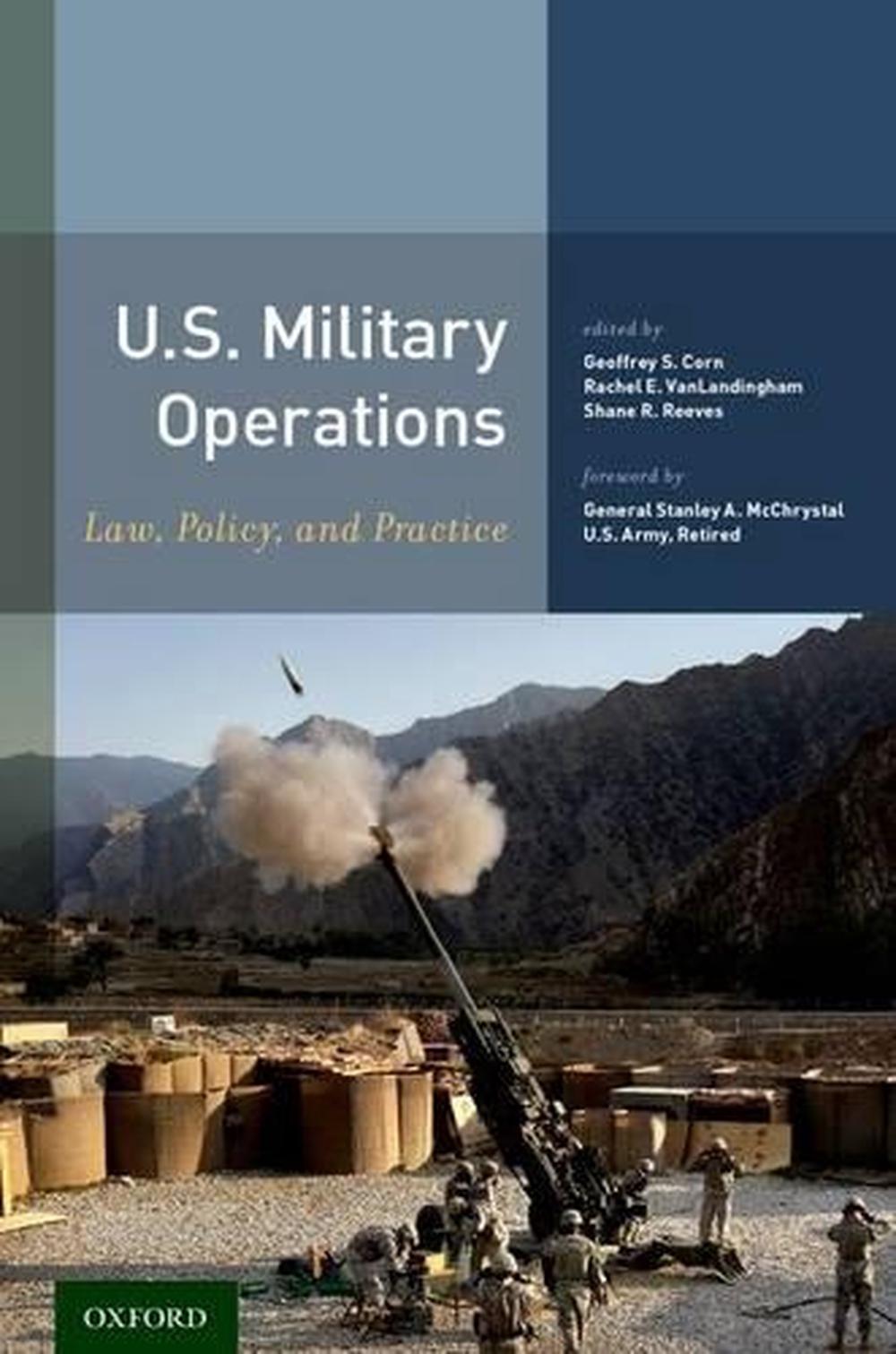
U.S. Military Operations
Law, Policy, and Practice
$158.98
- Paperback
880 pages
- Release Date
21 January 2016
Summary
In U.S. Military Operations: Law, Policy, and Practice, a distinguished group of military experts comprehensively analyze how the law is applied during military operations on and off the battlefield. Subject matter experts offer a unique insiders perspective on how the law is actually implemented in a wide swath of military activities, such as how the law of war applies in the context of multi-state coalition forces, and whether non-governmentalorganizations involved in quasi-military operati…
Book Details
| ISBN-13: | 9780190456634 |
|---|---|
| ISBN-10: | 0190456639 |
| Author: | Geoffrey S. Corn, Rachel E. VanLandingham, Shane R. Reeves, General Stanley A. McChrystal, Stanley A. McChrystal |
| Publisher: | Oxford University Press Inc |
| Imprint: | Oxford University Press Inc |
| Format: | Paperback |
| Number of Pages: | 880 |
| Release Date: | 21 January 2016 |
| Weight: | 1.20kg |
| Dimensions: | 231mm x 155mm x 38mm |
What They're Saying
Critics Review
“This book should be considered an essential resource for anyone genuinely interested in understanding the law of military operations. No true understanding of the exercise of U.S. military power can be attained without a solid appreciation for how the law shapes military missions and their outcomes. This book contributes to that appreciation, and it does so with a nuanced sophistication I’ve come to expect from the remarkable ranks of attorney warfighters whoare the United States’ JAGs.” (From the Foreword)-General Stanley A. McChrystal, U.S. Army, Retired”Before this era of asymmetric warfare, insurgencies, and terrorist attacks by non-state groups law was decidedly a backwater in the execution of military operations. As this book skillfully shows, times have changed. Law is now at the heart of battlefield operations, from planning to execution and after-action assessments. The authors deftly weave together a wide range of operational environments to show just how integral the JAGs are to the fighting force.“-William C. Banks, Board of Advisors Distinguished Professor and Director, Institute for National Security and Counterterrorism, Syracuse University”Superb analyses of the hottest legal issues in contemporary military operations, written by leading military law scholars and current and former Judge Advocate Generals based on their experiences in Iraq, Afghanistan, and elsewhere. From drones to detention to cyber warfare, this book demonstrates how carefully the U.S. military adheres to international law. U.S. Military Operations is a must-read for anyone who wants to understand the role of the U.S.military lawyer or the laws applicable to modern warfare.” -John B. Bellinger III, former Legal Adviser to the Department of State”Applying the Laws of War created after WWII to today’s ‘legally intensive’ battlefields has challenged both commanders and their uniformed lawyers. In this text, the editors have gathered the lessons learned and best practices from a wide array of experts whose expertise has been gained in the crucible of personal experience. This insider’s perspective is invaluable to all who support the Rule of Law and especially to those who must implement the law inmilitary operations.” -Walter B. Huffman, Dean Emeritus and Professor of Law, Texas Tech University School of Law, Major General, U.S. Army, Retired”The genius of the book is in the great selection of authors-all of whom write clearly and concisely-and in the special selection of subjects that take a fresh, unique perspective on the function of law on the battlefield. The authors address, specifically, among many other subjects: Medical Operations, Intelligence Law, Environmental Law, and ICRC operations in the combat theatre.” -John D. Altenburg, Jr., Major General, United States Army, Retired, FormerDeputy Judge Advocate General, Army, Senior Counsel, Greenberg Traurig
About The Author
Geoffrey S. Corn
Geoffrey S. Corn is a Professor of Law at South Texas College of Law in Houston; he retired in 2004 from the U.S. Army as a Lieutenant Colonel. Professor Corn’s teaching and scholarship focuses on the law of armed conflict, national security law, criminal law and procedure, and prosecutorial ethics. He has appeared as an expert witness at the Military Commission in Guantanamo, the International Criminal Tribunal for the Former Yugoslavia, and infederal court. Professor Corn is the lead author of The Law of Armed Conflict: An Operational Perspective, co-author of The War on Terror and the Laws of War, Second Edition, and a co-author of Principles ofCounter-Terrorism Law.Rachel E. VanLandingham is an Associate Professor of Law at Southwestern Law School in Los Angeles; she retired in 2012 from the U.S. Air Force as a Lieutenant Colonel. Her teaching focuses on national security law, criminal law, and criminal procedure. The Vice President of the National Institute of Military Justice, Professor VanLandingham’s scholarship includes articles on both military justice and international humanitarian law, the latter greatly influenced by her operational experienceas the Chief, International Law at HQ, U.S. Central Command while on active duty.Shane R. Reeves is a Lieutenant Colonel in the United States Army. He is an Associate Professor and the Deputy Head in the Department of Law at the United States Military Academy, West Point. Additionally, he is also the Program Director for the Law and Legal Studies Major and the Course Director for Constitutional and Military Law, which is required of all cadets. A 1996 West Point graduate, LTC Reeves served in several operational positions as both an Armor officer and as aJudge Advocate. He has a number of publications and lectures often on the law of armed conflict.
Returns
This item is eligible for free returns within 30 days of delivery. See our returns policy for further details.




